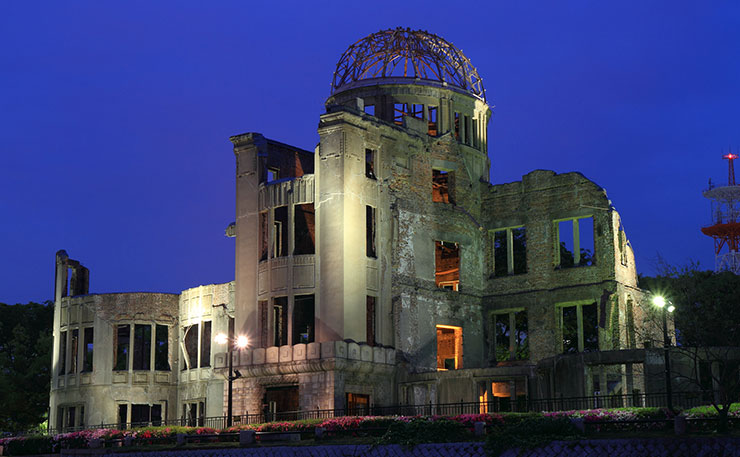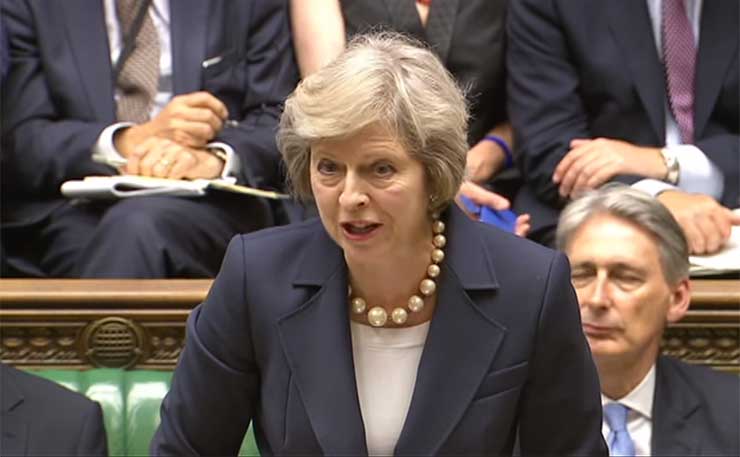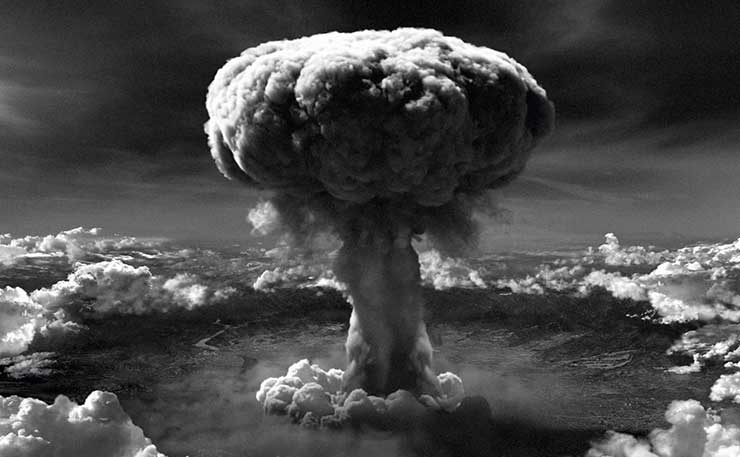There is some light on the horizon in terms of the international fight to ban nuclear weapons. But it’s certainly not emanating from Australia, writes Dr Sue Wareham.
Early August marks the anniversaries of the atomic bombings on August 6 and 9, 1945, of Hiroshima and Nagasaki – dates which most often come and go with little to offer except a terrifying reminder of humanity’s capacity to destroy ourselves. Nevertheless, we’ve made it to 71 years, having tempted fate with tens of thousands of the most destructive devices ever created, escaping within a whisker of global catastrophe more times than bears thinking about.
Still, there are over 15,000 nuclear weapons in the hands of just nine nations – Russia, the US, China, France, the UK, India, Pakistan, Israel and North Korea. Double standards that divide the world into nuclear weapons haves and have nots are writ large – stark, provocative and unsustainable.
However, in this 71st anniversary year, some good news is creeping in. The stranglehold that the nuclear-armed states have held on the disarmament agenda is starting to unravel. In recent years, a groundswell of governments and civil society actors have demanded with increasing clarity and effect that humanitarian imperatives take precedence over the military doctrines of nine countries.
In a nutshell, the effects of a nuclear weapon explosion are so catastrophic that the weapons must never be used again. As a result, 127 nations and counting have signed the “Humanitarian Pledge” that commits them to efforts to “stigmatise, prohibit and eliminate” the weapons.

These are not empty words. The UN has initiated an Open-Ended Working Group (OEWG) which met in February and May this year in Geneva, and will meet for the last time from August 5 to 19, to discuss “legal provisions and norms” for a nuclear weapons free world.
The group will make recommendations to the UN General Assembly which meets later in the year, and negotiations for a treaty to ban nuclear weapons are high on the list of expected recommendations. Already, some nations are urging the commencement of such negotiations as early as 2017.
The OEWG’s dreary title is unfortunate, for its very existence is nothing short of historic. It is bringing us closer than we have ever been to stigmatising, banning and eliminating the worst of all weapons of mass destruction.
The Australian government’s role, notwithstanding its ineffectual murmurings about how bad the weapons are, has been to lead the charge in opposing the growing push for a ban treaty, arguing that, without the support of the nations with the weapons, it’s an impractical process. That’s a bit like arguing that we must consult with criminals about the sort of laws they’d agree to before we enact any.
It also misrepresents the purpose of a ban treaty, which is to delegitimise and stigmatise the weapons and change the legal landscape by which nations are judged.
Australia’s stance, of course, has everything to do with our reliance on “extended nuclear deterrence”, which is a preparedness to have US weapons destroy cities on our behalf. Just which cities, or in what circumstances, the government refuses to say.
Two other classes of weapons of mass destruction – chemical and biological – are both explicitly banned by treaty. In 2014, former UN high representative for disarmament affairs, Angela Kane, described the strong stigma that the prohibitions attract:
“How many states today boast that they are ‘biological-weapon states’ or ‘chemical-weapon states’? Who is arguing now that bubonic plague or polio are legitimate to use as weapons under any circumstance, whether in an attack or in retaliation?”
Let’s look at the example of the UK, whose leader in 2003 helped initiate a catastrophic war based on the lie that Iraq had weapons of mass destruction. On July 18 this year, the British parliament voted strongly in favour of renewing, at budget-breaking expense, the country’s own WMD program, the Trident nuclear submarines.

The new British PM, Theresa May confirmed that she would be prepared to press the button that unleashes them. No doubt she is aware that when Trident was chosen in 1980 as a replacement for its predecessor, Polaris, it was estimated to be capable of killing up to 10 million Russians.
If, however, a ban treaty were already in place, the pressure that could have been exerted for Britain to abandon these horrific weapons is likely to have been overwhelming. To vote to renew a WMD program is bad enough, but to do so when the vast majority of the world’s governments have banned these weapons because they are immoral and illegitimate could prove one step too far.
If we’re serious about a nuclear weapons free world, it is imperative that the current momentum for a ban treaty is not lost. The nuclear-armed states and their supporters such as Australia are doing their best to undermine it. From the perspective of the rest of the world however, criminals are not the best people to have control of the law.
Finally the “never again” plea from the survivors of Hiroshima and Nagasaki has a glimmer of optimism about it. We face enormous opportunities as well as challenges.
Donate To New Matilda
New Matilda is a small, independent media outlet. We survive through reader contributions, and never losing a lawsuit. If you got something from this article, giving something back helps us to continue speaking truth to power. Every little bit counts.





